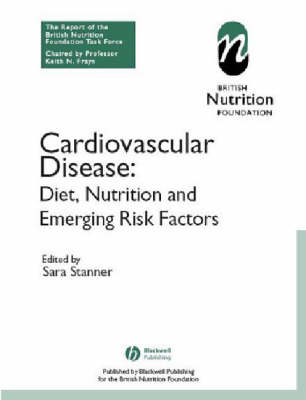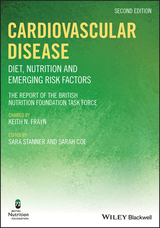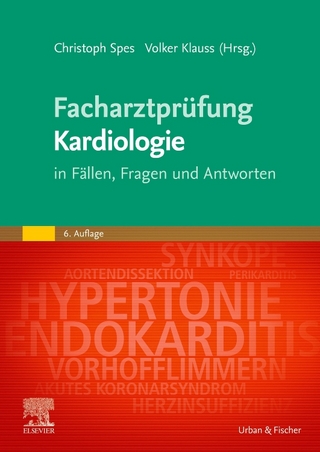
Cardiovascular Disease
Wiley-Blackwell (an imprint of John Wiley & Sons Ltd) (Verlag)
978-1-4051-0166-0 (ISBN)
- Titel ist leider vergriffen;
keine Neuauflage - Artikel merken
This important and timely book comprises the comprehensive and authoritative independent report of the British Nutrition Foundation Task Force on the link between emerging aspects of diet and cardiovascular disease, a major cause of early death and disability. Written by leading experts in the area, "Cardiovascular Disease: Diet, Nutrition and Emerging Risk Factors" looks further than the well recognised factors, such as high blood cholesterol and smoking to identify and explore more subtle markers of risk. Chapters include coverage of novel lipid factors, vascular function, clotting factors, inflammatory factors, oxidative stress and homocysteine and early origins of adult disease. The impact of obesity, insulin resistance, genetic predisposition and factors related to adipose tissue are also addressed. Of vital use to a wide range of health professionals, this cutting-edge book provides the reader with: core information for health professionals, as well as those involved in food formulation in the food industry; a dedicated question and answer chapter; and important conclusions and recommendations with 'take-home messages'.
Dietitians, nutritionists, general and family practitioners, cardiologists, cardiovascular specialists, community nurses, personnel in the food industry involved in product formulation, production, labelling of packaging and marketing will find this a valuable reference. Lecturers, undergraduates and postgraduates in nutrition, dietetics, food science and medicine; libraries in all research establishments, commercial organisations, medical schools and universities where these subjects are studied or taught will also find this an important addition to their shelves.
Sara Stanner BSc MSc RPHNutr FAfN serves as Science Director. The British Nutrition Foundation is a registered charity. It promotes the wellbeing of society through the impartial interpretation and effective dissemination of scientifically based knowledge and advice on the relationship between diet, physical activity and health.
Foreword. Terms of Reference. Task Force Membership. 1 The Aetiology and Epidemiology of Cardiovascular Disease (Professor Keith Frayn and Sara Stanner). 1.1 Definitions. 1.2 Pathogenesis. 1.3 Epidemiology of cardiovascular disease. 1.4 Risk factors for cardiovascular disease. 1.5 Role of diet. 1.6 Structure of the report. 1.7 Key points. 1.8 Key references. 2 Metabolic Syndrome: Insulin Resistance, Obesity, Diabetes Mellitus, Hypertension, Physical Activity and Genetic Factors (Dr Simon Coppack, Dr Vidya Mohamed-Ali and Dr Fredrik Karpe). 2.1 Aim of this chapter. 2.2 Overlap of insulin resistance, obesity and physical inactivity. 2.3 Insulin resistance. 2.4 Obesity. 2.5 Diabetes mellitus. 2.6 Hypertension. 2.7 Dietary effects on obesity, insulin resistance, diabetes and hypertension. 2.8 Physical activity. 2.9 Genetics. 2.10 Summary. 2.11 Key points. 2.12 Key references. 3 Lipid-Related Factors (Dr Fredrik Karpe). 3.1 Atherogenic lipoproteins. 3.2 Postprandial lipaemia - atherogenic lipoprotein phenotype. 3.3 Remnant-like particles. 3.4 Small, dense low-density lipoprotein (LDL). 3.5 High-density lipoprotein (HDL) subfractions. 3.6 Free fatty acids. 3.7 Lipoprotein(a). 3.8 Genetic variability and cardiovascular risk. 3.9 Key points. 3.10 Recommendations for future research. 3.11 Key references. 4 Endothelial Dysfunction (Dr Naveed Sattar and Professor Gordon Ferns). 4.1 Introduction. 4.2 Estimates of endothelial dysfunction. 4.3 Aetiology of endothelial damage: association with classical and novel risk factors. 4.4 Endothelial dysfunction as an integrated pathway for coronary heart disease (CHD) risk. 4.5 Endothelial function measures as independent predictors of CHD. 4.6 Relevant genetic studies. 4.7 Prevention and reversibility of endothelial dysfunction. 4.8 Effects of CHD preventative modalities on other risk factor pathways. 4.9 Dietary modulations of endothelial function. 4.10 Do nutrient-induced endothelial effects correlate with results from endpoint studies? 4.11 Key points. 4.12 Recommendations for future research. 4.13 Key references. 5 Oxidative Stress (Professor K. Richard Bruckdorfer). 5.1 Introduction. 5.2 The normal role of LDL. 5.3 Free radicals. 5.4 Molecular targets for oxidation. 5.5 Reactive nitrogen species. 5.6 Cardiovascular disease and oxidative reactions. 5.7 Oxidation of LDL in the artery wall. 5.8 Nature of the oxidising species causing LDL oxidation. 5.9 Cardiovascular disease and the consumption of fruit and vegetables. 5.10 Therapeutic use of antioxidants: evidence from intervention trials. 5.11 Oxidative stress and exercise. 5.12 Measurable factors for oxidative stress in cardiovascular disease. 5.13 Markers of oxidant stress in cardiovascular disease. 5.14 Relationships of the markers of oxidant stress to general nutrition and antioxidants. 5.15 Conclusions. 5.16 Key points. 5.17 Recommendations for future research. 5.18 Key references. 6 The Haemostatic System: Coagulation, Platelets and Fibrinolysis (Professor George Miller and Professor K. Richard Bruckdorfer). 6.1 The haemostatic system. 6.2 The fibrinolytic system. 6.3 The concept of hypercoagulability. 6.4 Established haemostatic risk factors for vascular disease. 6.5 Platelet function tests. 6.6 Emerging phenotypic risk factors for CHD. 6.7 Established and emerging phenotypic risk factors for stroke. 6.8 Established and emerging phenotypic risk factors for venous thromboembolism. 6.9 Genetics and cardiovascular disease risk. 6.10 Dietary characteristics and haemostasis. 6.11 Key points. 6.12 Recommendations for future research. 6.13 Key references. 7 Inflammation-Related Factors (Dr Parveen Yaqoob and Professor Gordon Ferns). 7.1 Introduction. 7.2 The immune system. 7.3 Inflammation and atherosclerosis. 7.4 Risk factors. 7.5 Are the inflammatory risk factors equivalent? 7.6 Infectious burden, inflammation and atherosclerosis. 7.7 Pharmacological agents with anti-inflammatory effects in cardiovascular disease. 7.8 Dietary factors and inflammation. 7.9 Key points. 7.10 Recommendations for future research. 7.11 Key references. 8 Homocysteine (Dr Robert Clarke). 8.1 Introduction. 8.2 Biochemistry. 8.3 Laboratory measurement of homocysteine. 8.4 Evidence relating homocysteine with risk of cardiovascular disease. 8.5 Pathophysiology of vascular disease. 8.6 Determinants of homocysteine. 8.7 Genetic influences. 8.8 Dietary influences. 8.9 Effects of vitamin supplements on homocysteine. 8.10 Large trials of homocysteine lowering vitamin supplements. 8.11 Folic acid fortification. 8.12 Key points. 8.13 Recommendations for future research. 8.14 Key references. 9 Adipose Tissue-Derived Factors (Dr Vidya Mohamed-Ali and Dr Simon Coppack). 9.1 Introduction. 9.2 Leptin. 9.3 Acylation stimulating protein (ASP). 9.4 Adiponectin. 9.5 Adipose tissue-derived cytokines. 9.6 Angiotensinogen. 9.7 Resistin. 9.8 Peroxisome proliferator-activated receptors (PPARs). 9.9 Other adipose factors associated with cardiovascular disease. 9.10 Nutritional regulation of adipocyte factors. 9.11 Physical activity and adipokines. 9.12 Genetic determinants of adipokines. 9.13 Conclusion. 9.14 Key points. 9.15 Recommendations for future research. 9.16 Key references. 10 Fetal and Maternal Nutrition (Dr Caroline Fall). 10.1 Low birthweight and adult cardiovascular disease. 10.2 Size at birth and cardiovascular disease risk factors. 10.3 Post-natal growth and adult obesity. 10.4 Variation with sex. 10.5 Variation with ethnicity. 10.6 The 'Fetal Origins of Adult Disease (FOAD)' hypothesis. 10.7 Clinical importance of the effects of poor fetal growth. 10.8 The role of nutrition. 10.9 Maternal diabetes and fetal macrosomia. 10.10 Key points. 10.11 Recommendations for future research. 10.12 Key references. 11 Diet and Cardiovascular Disease: Where Are We Now? (Dr Judith Buttriss). 11.1 Introduction. 11.2 Structure of the chapter. 11.3 Diet and body fatness: amount and distribution. 11.4 Diet and hypertension. 11.5 Diet and diabetes. 11.6 Diet and insulin sensitivity. 11.7 Amount of dietary fat. 11.8 Type of dietary fat. 11.9 Other dietary components that influence blood cholesterol. 11.10 Relationship of diet with other risk factors. 11.11 Conclusions. 11.12 Key points. 12 Physical Activity: Where Are We Now? (Dr Judith Buttriss and Professor Adrianne Hardman). 12.1 Introduction. 12.2 Role of physical activity in promoting cardiovascular health. 12.3 How much is required? 12.4 Successful interventions. 12.5 Recent initiatives in the UK. 12.6 Key points. 12.7 Recommendations for future research. 12.8 Key references. 13 A Public Health Approach to Cardiovascular Disease Risk Reduction (Dr Judith Buttriss). 13.1 Cardiovascular disease as a public health problem. 13.2 Current dietary recommendations for primary prevention in the UK. 13.3 Recommendations in other countries. 13.4 Dietary trends in the UK and comparison of these with the guidelines. 13.5 Are the recommendations on diet and cardiovascular disease in need of revision? 13.6 Health promotion in children. 13.7 Health promotion for other groups. 13.8 Barriers to change - the role of the food industry. 13.9 Effective intervention. 13.10 Looking to the future: gene-nutrient interactions. 13.11 Key points. 14 Conclusions of the Task Force. 14.1 Chapter 1. 14.2 Chapter 2. 14.3 Chapter 3. 14.4 Chapter 4. 14.5 Chapter 5. 14.6 Chapter 6. 14.7 Chapter 7. 14.8 Chapter 8. 14.9 Chapter 9. 14.10 Chapter 10. 14.11 Chapter 11. 14.12 Chapter 12. 14.13 Chapter 13. 15 Recommendations of the Task Force. 15.1 Priorities for future research: emerging cardiovascular disease risk factors. 15.2 Priorities for future research: physical activity and cardiovascular disease. 15.3 Priorities for future research: identifying effective dietary interventions. 15.4 General recommendations. 15.5 Key references. 16 Cardiovascular Disease: Answers to Common Questions from Medical Journalists. 16.1 Definition of cardiovascular disease. 16.2 Epidemiology of cardiovascular disease. 16.3 Definitions and prevalence of diabetes, the insulin resistance syndrome and obesity. 16.4 Lipid-related factors. 16.5 The role of the endothelium. 16.6 Diet and oxidative stress. 16.7 Diet and blood clotting. 16.8 Inflammation. 16.9 Homocysteine. 16.10 Factors relating to adipose (fat) tissue. 16.11 Nutrition during pregnancy and fetal growth. 16.12 The effect of different diets on heart disease risk. 16.13 Physical activity. 16.14 Public health recommendations to reduce cardiovascular disease risk. 16.15 Key references. Glossary. References. Index.
| Erscheint lt. Verlag | 6.4.2005 |
|---|---|
| Reihe/Serie | British Nutrition Foundation |
| Verlagsort | Chicester |
| Sprache | englisch |
| Maße | 189 x 246 mm |
| Gewicht | 748 g |
| Themenwelt | Medizinische Fachgebiete ► Innere Medizin ► Kardiologie / Angiologie |
| ISBN-10 | 1-4051-0166-0 / 1405101660 |
| ISBN-13 | 978-1-4051-0166-0 / 9781405101660 |
| Zustand | Neuware |
| Haben Sie eine Frage zum Produkt? |
aus dem Bereich



